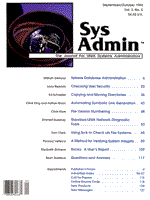
Listing 1: The vedit script
1 :
2 #
3 # vedit - VI version editing
4 # Copyright Unilabs Research Group, 1994
5 #
6 # This program implements file version numbering like that which is
7 # used on DEC VAX systems.
8 #
9 # Check to insure that we have at least one option, and print an error
10 # if we don't
11 #
12 if [ $# -lt 1 ]
13 then
14 echo "Usage: `basename $0` file [file ...]"
15 exit 1
16 fi
17 #
18 # loop for each file in the argument list
19 #
20 for file in $*
21 do
22 #
23 # Determine if the file is under "version" control
24 # list the files which start with the name in the argument list and pipe
25 # that list into grep, looking for files under VersionVI control. Pipe
26 # that list into sed substituting spaces for alphabetic and numerical
27 # characters followed by a semi-colon. Pipe that list into sort doing a
28 # reverse numerical sort, and reading the first line.
29 #
30 verList=`ls $file* | grep "$file;" |
31 sed 's/.*;//g' | sort -rn | head -1`
32 #
33 # If there is a version in this variable, then it is the highest version
34 # number in the file list.
35 #
36 if [ "$verList" ]
37 then
38 #
39 # increment the version number
40 #
41 version=`expr $verList + 1`
42 original="$file;$verList"
43 newfile="$file;$version"
44 else
45 #
46 # This is a new file - start the version at 1
47 #
48 version=1
49 original="$file"
50 newfile="$file;$version"
51 #
52 # Check to see if the file REALLY EXISTS
53 #
54 if [ ! -f ${original} ]
55 then
56 touch ${original}
57 fi
58 fi
59 #
60 # We have to copy the last edit file to the new version so we have
61 # something to edit.
62 #
63 error=`cp ${original} ${newfile} 2>&1`
64 #
65 # OOPS - there was an error
66 #
67 if [ $? -ne 0 ]
68 then
69 error=`echo $error | sed 's/.*: //g' 2>&1`
70 echo "Your edit of ${newfile} is aborted."
71 echo "Attempting to access ${original} has reported the follwing \c"
72 echo "system error\n\n\t$error\n"
73 echo "Aborting edit."
74 exit 2
75 fi
76 echo "Loading ${newfile} for edit ..."
77 # Load vi and edit
78 #
79 vi ${newfile}
80 if [ $version -gt 1 ]
81 then
82 #
83 # See of the user actually made changes
84 #
85 diff ${original} ${newfile} 2>&1 >/dev/null
86 EDIT=$?
87 else
88 #
89 # This is the first edit - so don't run diff, and record the
90 # edit history
91 #
92 if [ -r ${newfile} ]
93 then
94 EDIT=1
95 fi
96 fi
97 #
98 # the user DID make changes
99 if [ EDIT -eq 1 ]
100 then
101 #
102 # Count the number of lines and bytes in the file
103 #
104 set `wc ${newfile}`
105 lines=`echo $1 | sed 's/ //g'`
106 bytes=`echo $3 | sed 's/ //g'`
107 #
108 # record the edit history for this file
109 #
110 echo "${newfile}\t`logname`\tlines=${lines}\tbytes=${bytes}\
111 `date`" >> $file.INDEX
112 #
113 # Now link the newly edited version to the basename - that is the file
114 # name without using the version number
115 #
116 ln $newfile $file
117 else
118 #
119 # remove the higher version copy as the user made NO changes
120 #
121 echo "${newfile} was not edited. Restoring to ${original}"
122 rm ${newfile}
123 fi
124 done
|